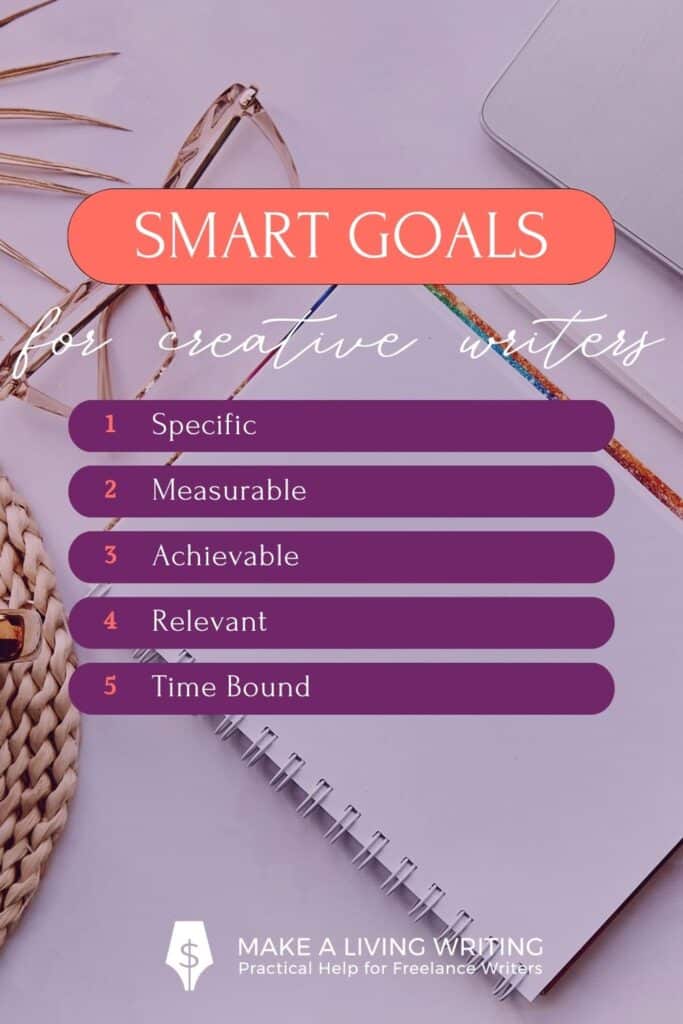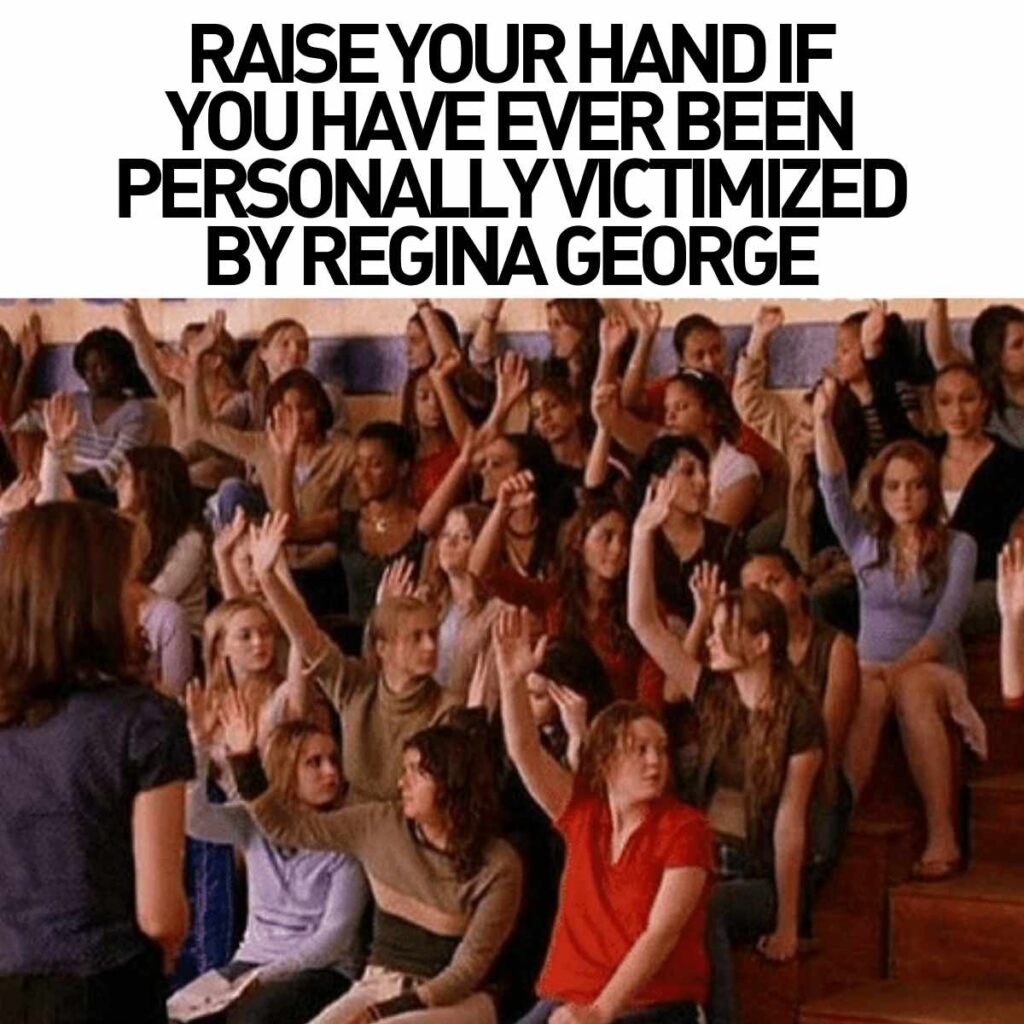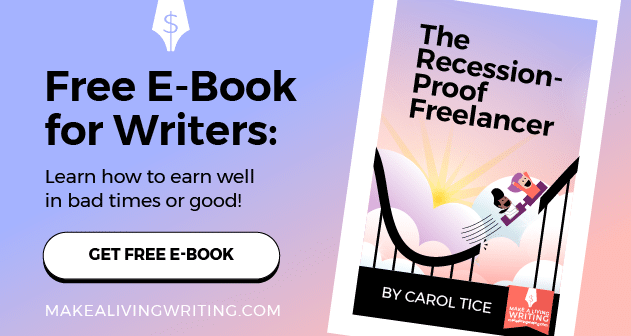If you’re a creative writer, you may not be known for things like “organization” and “structure,” but this doesn’t have to be the case! We’ve put together smart goals ideas and smart goals examples to demonstrate how creating structured goals can actually enhance your creativity, not limit it.
(Seriously.)
Smart Goals Ideas for Creative Writers
Smart goals is a style of goal setting that helps tease out the finer details that will turn a vague idea into a road map for achieving your goals.
By applying these smart goals examples and smart goals ideas, creative writers (and writers of every type) can work towards reaching their big objectives while still getting the best from their art.
What is a Smart Goal?
S.M.A.R.T is an acronym to help you break down the details of exactly what, when, why, and how you’re planning to reach your goals.
S—Specific
Get clear on exactly what you want.
Creative writers can often face challenges with vague goals and aspirations. Instead of having a goal to “write more,” be more specific, with goals such as entering five contests or finishing the first draft of your manuscript this year.
M—Measurable
How are you going to track your progress toward your goal?
Using metrics like word counts, hours worked, or number of clients can help you be more accountable to your goals.
A—Achievable
Is this goal something you will realistically be able to accomplish?
Setting big goals is motivational, but setting unrealistic goals isn’t helpful. They just leave you feeling discouraged.
Your goal should be something challenging enough that you will need to push yourself, but not so out of reach that you cannot possibly be successful.
R—Relevant
Your smart goals should be in line with your values, current projects, or future plans.
Don’t just set a goal of writing a novel if it’s not relevant to the work you want to pursue. Think about what matters to you and set goals that will get you closer to your larger objectives.
T—Time Bound
Give yourself a deadline and check in points to stay on track.
Without a timeline, it’s easy to become complacent and put off working toward your goals. The consequence? You’ll eventually drop them. Whether it’s a week, month, or yearlong commitment, set a date and stick to it.
Using the smart goal format, you can create goals for any area of your life from personal, financial, business and even creative that are clear and actionable.

How Setting Smart Goals Can Help Creative Writers
I’ve heard it said that creativity thrives in chaos, but writers don’t have to fear their creativity being stifled by setting structured goals. Smart goals can help creative writers keep the chaos…it just becomes organized chaos.
Honestly, smart goals work for everyone—including creative writers. Here are a few ways that creative writers can benefit from smart goals.
Guide Creativity
Writers are known for their imagination. And guess what? The beauty of smart goals is they can be customized into whatever you want or need them to be. The right smart goals give you just enough structure and direction to channel your creativity and allow you to use more of your energy on creating your best work.
Measure Milestones
If your goal is too broad or non-existent, it can be difficult to measure your progress. Setting multiple smart goals can help you clearly see the different pieces or aspects of your project. This makes it easier to see progress, stay focused on your objectives, and allows you to celebrate reaching milestones along the way.
Prevent Overwhelm
Are you even a writer if you haven’t stared endlessly at a blank page or screen for what feels like hours or days? This can happen for a number of reasons, but when a task seems too huge it easily leads to thoughts that lead to overwhelm and lack of action.
Breaking up big projects or goals into specific, achievable tasks can help you maintain progress and feel more accomplished.
Ditch Procrastination
Raise your hand if you’ve ever felt personally victimized by Regina George procrastination.

Without deadlines, it’s easy to put off projects or spend too much time on them. Having a timeline and/or due date is not meant to handcuff you or stifle creativity. Look at deadlines more as a motivator to move past procrastination and perfectionism in favor of urgency and getting words on paper.
Two Smart Goals Ideas for Creative Writers
Goals are not one-size-fits-all. Putting in a bit of effort into setting solid smart goals from the start can lead to big results.
Let’s look at some smart goals examples and smart goals ideas to kick-start the process.
Smart Goals Examples 1/2
Weak goal: I want to get recognized for my work.
- Specific: I will submit this piece to reputable literary magazines and be published in at least one
- Measurable: I will submit this piece to one magazine each month this year
- Achievable: With my skill and experience in creative writing it is realistic that I will be accepted by at least one literary magazine
- Relevant: This aligns with my professional growth plan by getting my name out there, making connections and getting recognition to further my reach in the writing community
- Time-bound: By the end of the year I will have submitted to 12 literary magazines and been published in at least one
Smart goal: I will submit my piece to one literary magazine each month of this year with the goal of being published in at least one so I can be recognized for my work and further my reach in the writing community. I will know I have reached my goal if I have submitted to 12 magazines by December 31 and been published in at least one.
Smart Goals Examples 2/2
Weak goal: I want to write more.
- Specific: I will write at least 500 words each day for the next three months
- Measurable: I will track my daily word count in a digital spreadsheet and reach a total of 45,000 words by the end of the three month period
- Achievable: 500 words a day is realistic with my current schedule of writing 30-minutes per day
- Relevant: This aligns with my aspiration of turning my hobby into a profession by getting more practice and experience in creative writing
- Time-bound: I have a clear three month time period to achieve this goal
Smart goal: I am committing to increasing my creative writing output to 500 words per day for the next three months to get closer to turning my hobby into a profession. I will set aside 30 minutes a day to write and track my word counts in a digital spreadsheet. I will know that I have reached my goal if I have written 45,000 words at the end of the three-month period.
If creativity thrives in chaos, then imagine how much it can flourish with a bit of direction!
Setting specific, measurable, achievable, relevant, time-bound goals does not mean your creativity will suffer. Let smart goals lighten your load so you can focus more energy on your craft.



